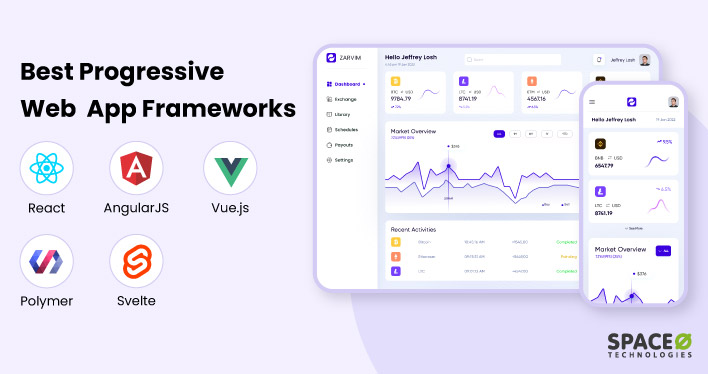- Angular, React, and Vue.js are the top 3 most popular progressive web app frameworks. You can pick any of these three frameworks for progressive web app development. These frameworks are the first choices of various developers and have decent ratings on the popular code hosting platform GitHub.
- Apart from ratings and first choice of developers Angular, React, and Vue.js offers more flexibility, scalability, and versatility that make them the unique and the first choice of popular websites like Facebook, Gmail, and Grammarly.
Key Takeaways
Are you planning to build a progressive web app like Twitter, Starbucks, or Spotify and finding difficulty in choosing the right framework? — If yes, then you are at the right place.
With the advancement in web technologies and the increasing popularity of PWA, it is difficult for beginners to find an excellent framework to build their progressive web apps. With so many different options available, choosing the best framework for your PWA can be challenging.
Being a leading progressive web application development company, we know the best frameworks that help you build scalable PWA. So, we have written this article about the list of top progressive web app frameworks.
Nevertheless, let’s get started by understanding what PWA is.
Table of Contents
What is Progressive Web Application?
Progressive web app is a web app that delivers a native app-like experience to users by incorporating modern technologies and frameworks. Progressive web apps are designed and developed to be used on multiple mobile devices, desktops, smartphones, and tablets.
Moreover, PWA leverages phenomenal features that include push notifications, background sync, intuitive UI/UX, and service workers, which allow offline functionalities and caching of app resources. Additionally, PWAs takes advantage of server-side rendering, a technique that enables high-speed rendering web pages on the server before sending them to the client, resulting in faster loading times.
Now let us move to our next step and find the details and important considerations on the top 5 progressive web app frameworks with a quick overview.
Top 5 PWA Frameworks for Progressive Web App Development
Here is an overview of top PWA tools for developing progressive web applications.
| Frameworks | GitHub Rating | Programming Languages Used (as per GitHub) | Developers using Framework (%) (Statista Report) | Popular PWAs Developed |
|---|---|---|---|---|
 React React |  211k 211k |
| 40.58% |
|
 Angular Angular |  89.4k 89.4k |
| 17.46% |
|
 Vue.js Vue.js |  205k 205k |
| 16.38% |
|
 Polymer Polymer |  21.9k 21.9k |
| N. A |
|
 Svelte Svelte |  71.4k 71.4k |
| 6.62% |
|
Now, let’s move on to the next section, which helps you with the list of top progressive web app frameworks with their pros and cons.
Do You Have a Progressive Web App Idea?
Let’s discuss it together. Our skilled progressive web app developers validates your web app idea and helps your vision into a reality.

Now, let’s discuss all these frameworks in detail.
The below-mentioned list of PWA frameworks makes it easier for you to choose the right PWA framework for your progressive web apps. Here is the list of 5 progressive web app frameworks:
React
React is a popular JavaScript framework from Facebook with a large community of developers familiar with it. One of React’s key features is the use of a virtual DOM, which allows for efficient updates to the actual DOM, resulting in high-performance web apps.
Additionally, React has built-in support for offline functionality, enabling PWA apps to load web pages seamlessly even during low or no internet connectivity. Due to its significant loading and shifting capabilities within distinct pages, React is a popular choice for developing both Single-Page Applications (SPA) and Multi-Page Applications (MPA) web apps.”
Using the React framework you can develop eCommerce, social media, and productivity apps that unlock limitless opportunities for startups and ongoing business. Moreover, at Space-O Technologies, we have 10+ years of experience in developing web apps using React framework for industries like eCommerce, social media, and on-demand apps.
Now let’s check out the pros and cons of React.
Pros of React Cons of React - React is an efficient virtual DOM for fast rendering that improves your app performance and user experience.
- React has strong state management capabilities like Redux and React context that help streamline complex requirements of the web app.
- React has an excellent ecosystem with abundant libraries that help you develop your PWA quickly and easily.
- React offers reusable and modular components that help you save on web development time and also promote consistency and efficiency across your application.
- React can be a complex framework due to the large library which makes it difficult to learn and use for developers.
- React apps are not as SEO-friendly as native apps, which means that they may not rank as well in search results.
- To develop a PWA on React developers need prior knowledge of JSX.
AngularJS
AngularJS, developed by Google, is the best PWA framework for building complex progressive web apps. AngularJS offers efficient tooling, progressive enhancement, TypeScript support, and a UI component library that helps you develop a complex web app seamlessly.
Moreover, with a virtual DOM, AngularJS enhances performance and enables a native-like user experience, even with high online traffic.
Now let’s go through the pros and cons of AngularJS.
Pros of AngularJS Cons of AngularJS - AngularJS is a relatively easy framework to learn and use, even if you don’t have a lot of experience with JavaScript.
- AngularJS is a flexible framework that allows you to create types of web apps like SPA, MPA, mobile apps, and web apps using MVP architecture, dependency injection, and expression architecture model.
- AngularJS is a high-performing framework that makes your web apps load quickly and more responsively.
- Applications built with AngularJS can score highly in search results since they are SEO-friendly.
- Angular’s syntax can be quite verbose, leading to longer code compared to other frameworks, which may reduce code readability for some developers.
- AngularJS concepts have specific syntax rules and patterns that require a thorough understanding, making it complex for new developers.
Vue.js
Vue.js is an open source PWA framework, which makes it ideal for building high-performance applications. Moreover, Vue.js is flexible and versatile, and can be used in web development of both simple and complex types. One of its notable features is the use of a virtual DOM, which contributes to its high-performing, scalable, and responsive web app development capabilities.
Additionally, Vue.js provides seamless support for handling browser downloads and server-side rendering making it a popular choice for developers working on PWA development.
Let’s have a look at a Vue.js framework’s pros and cons for WEB development.
Pros of Vue.js Cons of Vue.js - Vue.js is known for its simplicity, making it easy to learn and use, even for developers with limited JavaScript knowledge.
- Vue.js offers various performance optimization techniques that ensure smooth UX and enables faster application rendering.
- Vue.js offers easy integration capabilities with existing projects through third-party extensions.
- Finding experienced Vue.js developers can be challenging due to the framework’s relatively smaller developer pool compared to other frameworks.
- Vue.js has a limited ecosystem compared to a larger framework.
Polymer
Polymer is highly extensible that can be customized to meet the specific needs of the application. Moreover, Polymer offers a highly extensible and customizable web app stack support with its App toolbox, enabling developers to quickly build progressive web apps that meet specific application needs.
Now, let’s have a quick look at the pros and cons of Polymer for PWA development.
Pros of Polymer Cons of Polymer - Polymer frameworks are lightweight and efficient which helps you create PWAs easily.
- Polymer helps developers develop a PWA that is compatible with a modern device browser.
- Polymers can be complex, especially for large and complex web apps.
- Polymer is not as well-suited for mobile as some other frameworks, such as Angular or React.
Svelte
Svelte, unlike conventional frameworks, takes a novel approach by shifting much of the heavy lifting from the browser to the compilation step. This unique characteristic enables Svelte to produce highly optimized, lightweight, and performant applications that load faster and run smoother.
As a result, developers can build feature-rich web applications with a fraction of the code found in other frameworks, leading to enhanced efficiency and ease of maintenance for developing progressive web apps.
Now let’s check out the pros and cons of Svelte.
Pros of Svelte Cons of Svelte - With a simple and intuitive syntax, Svelte is relatively easy to learn, especially for developers familiar with HTML, CSS, and JavaScript.
- Svelte embraces a component-based structure, promoting code modularity, and reusability.
- Debugging in Svelte applications can be slightly more challenging compared to other frameworks.
- While Svelte offers essential tools for development, the tooling ecosystem might not be as robust as that of other frameworks.
There are many PWA frameworks available on the market but we have listed the 5 top PWA frameworks knowing their capabilities, popularity, and performance. You can choose the right PWA framework for your web app considering your business requirements and needs.
However, if you still have a few questions on the PWA development framework you can check out our next section. It will help you with the answers that you are looking for.
Want to Hire a Dedicated Progressive Web App Developer?
Get in touch with us. We have a pool of experienced PWA developers. We help you filter the best developers for your project.
Here are FAQs that will help you clear your doubts regarding choosing a progressive web app framework.
Frequently Asked Questions About Progressive Web App Framework
How to choose the right framework for developing PWA
When choosing a framework for your PWA, you can consider the following factors such as:
- Your familiarity with the framework
- The size and complexity of your project.
- Existing web technologies.
- The specific features and functionalities required.
- The development tools, and the level of community support.
- Available resources for the framework.
Is it possible to use a combination of frameworks in developing PWA?
Yes, it is possible to use a combination of frameworks in your PWA. This is often referred to as “framework interoperability” and can be useful when different parts of your application are better suited for different frameworks.
Pick the Right Framework for Your Progressive Web App
When it comes to choosing a progressive web app framework, React, AngularJS, Vue.js, Polymer, and PWABuilder are among the top options available. Each framework has its strengths and considerations, such as React’s efficient rendering and ecosystem, AngularJS’s flexibility and performance, Vue.js’s simplicity and scalability, Polymer’s lightweight web components, and PWABuilder’s no-code platform.
By carefully considering the specific requirements and needs of your PWA project, you can select the most suitable framework to create a high-performing and engaging web app.
If you are still not able to pick the right framework to develop PWA, get in touch with us. We have skilled PWA developers that can help you choose the right progressive web app framework for your web app. Our experienced PWA developers advise you on the right framework and help you develop the PWA according to your idea.



